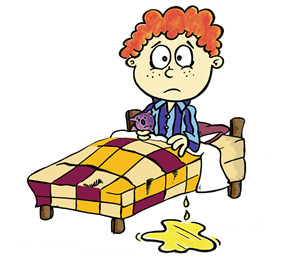Q. “My five-year-old can’t seem to stay dry at night. We’ve tried and tried, and nothing I do seems to work. She feels bad when she wets the bed, I try not to bother her about it, but I am very tired of the work it takes to deal with this. I get cranky, and that doesn’t help her learn. Do you have any light to shed on why my daughter can’t learn to stay dry at night? Any fresh ideas about what to do?”
 It’s so much work to deal with bedwetting! That added load of laundry per day can be infuriating. And once a pattern has set in, it can be difficult to find a way to change it. But I have an approach that is different from reward systems, waking a child in the night, and the kinds of training that are more familiar to parents who have to deal with kids who wet the bed.
It’s so much work to deal with bedwetting! That added load of laundry per day can be infuriating. And once a pattern has set in, it can be difficult to find a way to change it. But I have an approach that is different from reward systems, waking a child in the night, and the kinds of training that are more familiar to parents who have to deal with kids who wet the bed.
First, I’m sure you know that your daughter doesn’t wet her bed on purpose. She’d much rather stay dry. She’d also prefer to see you pleased and relaxed in the morning, unstressed by the extra work of washing sheets and making beds every day. Second, it might help you to know that 75% of all children up to age three can’t stay dry all night. And about 10% of all children up to the age of 5 can’t stay dry. Between the ages of 5 and 9, about 15% of bedwetting children each year will somehow figure out how to stay dry, without any particular kind of organized help. Only about 2% of children still wet the bed by the age of 15. We could guess that each family does try to help with this issue, that the efforts they make are varied in kind, and that most children figure out something that works sooner or later.
People who study children have lots of different ideas about why children wet the bed. It is a tendency that seems to run in families, which makes researchers think that it might be a tendency passed along in the genes. Other researchers have found that children who grow up at an economic disadvantage have a stronger tendency to wet the bed, which could indicate that stress, which is often higher in poor families, plays an important role.
You should have your daughter checked by a doctor or nurse, who will screen for urinary tract infections, diabetes, sickle cell anemia, and food allergies. Any of these illnesses can cause incontinence. Second, if you haven’t already, try restricting your child’s fluid intake late in the day, so her bladder won’t be so full at night. You can also try waking her once to pee before you go to sleep.
My experience over many years tells me that often, children’s bedwetting has emotional stress at its root. Children are built to be cherished, to spend large amounts of time with loving adults, and to explore their environment without fear of disapproval. Children who don’t get an easy start in life can become quite frightened on the inside. Circumstances like a difficult birth, premature birth, other early medical problems, being the witness to or the target of harsh treatment, or separation from one or more parents are bound to frighten an infant or a young child deeply.
The fear children carry inside them after events such as these can interfere with the ability to relax, to concentrate, to learn, to make friends, and sometimes, to control bodily functions. It is well known that a typical reaction to fear is to urinate. If you’ve ever picked a toad up out of its hiding place in the garden, you’ve felt this response to stress right there in your hand! Most mammals and many other creatures respond this way to fear as well.
You may not be able to think of an event that might have frightened your daughter, but that’s OK. You don’t have to know the cause of her fears in order to help her. She doesn’t have to know what frightens her, either. Her limbic system, the seat of her emotions and her emotional memory, is all set and ready to offload any tension that’s interfering with a good, dry night’s sleep.
To help a child who’s wetting the bed, there are several unconventional but effective steps you can take.
1) Give your child 5 or 10 minutes of your undivided attention and approval each day, or as often as you can, and say, “I’ll play anything you want to play for this Special Time.” Offer your love and stay close while your child decides what he/she wants to do. Use a timer, to start and stop. It helps a child build a closer, stronger connection with you, which she needs to hold against her fears.
2) Play games that elicit laughter, without tickling your child. Usually, games that allow children to laugh are ones in which we allow them to be stronger, faster, and smarter, and we are the ones who “lose” when we try to chase them, or bounce them off our knee, or give them 100 kisses. The more a child can laugh, the more she can offload tension that is in her way of living his life well.
3) Roughhouse with your child before bed. Physical play, in which children have permission to bang into us, be caught by us, squirm away from us, ride on our backs, and bounce around with us is deeply healing to any child who has had frightening things happen. You need to keep your eye on the play, so that your child is laughing as much as possible, and so that your affection and warmth toward her are plain to see. A game like “I’m going to give you 100 smooches!”, in which you land only 5 or 6 fleeting kisses, and she escapes, laughing, the rest of the time, is an example of the kind of roughhousing and physical play that children love, and that does them great good because lighter fears are shed as they laugh and “dominate” us. Do as much of this as you can—it is particularly helpful for bedwetting children, and particularly helpful as an evening-time activity.
4) Staylisten when your child cries or tantrums. Children need to have a time almost every day when they can get thoroughly upset about something. They need to have us come close, listen to their feelings, and simply care. They don’t need us to fix anything. They need us to slow down, hear how they feel, and allow them to shed the grief, fear, and anger feel at the moment. Afterwards, they feel very close to the person who listened to them, and often, their behavior shows obvious improvement.
Many is the parent I’ve encouraged to try roughhousing and Special Time to for bedwetting, and in every case so far, with children ages three to fourteen, a good wrestle, a good romp, a good tussle on the bed with an adult who’s up for some fun helps solve the nighttime wetting. Sometimes, the results are overnight. Sometimes, it takes a few weeks or months, because the child’s initial trauma, the source of the nighttime fears, is a serious or long-lasting trauma. But you will see improvement if you can play hard, play well, play with full-bodied enthusiasm, and Staylisten as the bigger feelings start to show.
Here’s how it can work:
“My husband has a son that he was separated from when the boy was two. He was not allowed to see his son, except for very short periods of time, for many years. Finally, at age 13, his mother consented to have him come and live with us for the summer. It had been a very long time since he’d seen his dad, at that point.
We noticed right away that he wet his bed every night. We just let it go at first, trying instead to concentrate on the positive things we wanted to do to help him feel loved and at home. Some days went well, others were harder, as you would expect after such a long separation. After awhile, I did a consultation with Hand in Hand to see what they could tell us about his bedwetting. The idea that he was scared, underneath, made sense to me: he was not raised in an easy environment, and how here he was with us, trying hard to make a go of his relationship with his dad. I was advised to try physical play—for him, that would be wrestling with his Dad—as a way to help ease and release some of the fears that might be causing his inability to stay dry at night.
Fortunately, we had a friend with a tumbling mat. We have a very small apartment, but we moved furniture around, and put the mat down. He was delighted, and the first night his Dad and he wrestled for about 45 minutes! It was one sweaty time. Both of them felt tired, but good, when they decided to stop. He did not wet the bed that night at all!
They wrestled several nights after that, and we saw that the nights they could wrestle, he didn’t wet the bed. The nights they didn’t, he did wet the bed. It seems that the physical contact, that very personal, very strenuous engagement, somehow got him into a state where his fears didn’t arise in the night, and make him lose control. It was so encouraging to see how direct an effect that kind of affectionate but all-out play could have on a young man whose life has been a struggle!”
—a step-mother in Oakland, CA
Save
Save
Save
